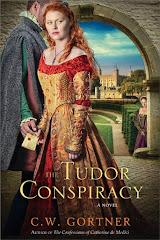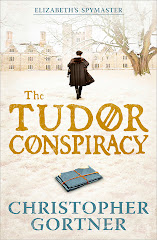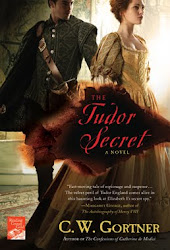 I'm delighted to welcome back Evan Ostryzniuk, whose second novel in the English Free Company series set in the medieval ages, OF FATHER AND SONS: Geoffrey
Hotspur and the Este Inheritance, is published this month. In this latest installment, Geoffrey and his companions travel to Italy and the land of the d'Este family, where the death of the marquis of Ferrara has left his eleven-year-old son as sole direct heir. Led by the skilled
but reckless Geoffrey Hotspur, an orphan-squire and ward of the mighty Duke of
Lancaster, the Company finds itself mired in the dangerous struggle between the Este heir and his rivals, confronting Geoffrey and Niccolo with the same question of, when does
the boy become the man?
I'm delighted to welcome back Evan Ostryzniuk, whose second novel in the English Free Company series set in the medieval ages, OF FATHER AND SONS: Geoffrey
Hotspur and the Este Inheritance, is published this month. In this latest installment, Geoffrey and his companions travel to Italy and the land of the d'Este family, where the death of the marquis of Ferrara has left his eleven-year-old son as sole direct heir. Led by the skilled
but reckless Geoffrey Hotspur, an orphan-squire and ward of the mighty Duke of
Lancaster, the Company finds itself mired in the dangerous struggle between the Este heir and his rivals, confronting Geoffrey and Niccolo with the same question of, when does
the boy become the man? Please join me in welcoming Evan Ostryzniuk!
The Este Inheritance and the War for Ferrara
The conflict that lies at the heart of my novel Of Fathers and Sons:
Geoffrey Hotspur and the Este Inheritance was the civil war in the Marquisate
of Ferrara fought during 1394-95 between two branches of the Este family.
Internecine wars were common in the Middle Ages, but the struggle for the small
but strategic territory in northeastern Italy was especially important for
reasons ranging from the geopolitical to the cultural.
By 1394, a very fragile balance of power was keeping the peace in
northern Italy, but tensions among the great and lesser city-states were
running high. The absence of central authority combined with rapidly growing
wealth and a sophisticated military culture had resulted in regular conflict
between city-states. Meanwhile, the smaller city-state played the alliance game
in order to survive, and few were more adept at this than the Este clan of
Ferrara. The Este lords of Ferrara had been clever enough to remain friendly
with its neighbors and the great powers for most of the 14th century, but this
success also relied on an unbroken line of experienced marquises and stability
within the clan. Twice the condominium amongst the branches of the family broke
down during the century, which nearly cost the entire family its inheritance!
However, as clever as the Este were, they did not always learn the lessons of
their own history.
When the Marquis of Ferrara and head of the Este clan Alberto died in
1393, he left as his sole heir his son Niccolo, who was not only just
ten-years-old, but also of illegitimate birth. Sure, the Roman pope okayed the
whole deal in exchange for a few florins, but it was still a chink in the armor
of the senior Este clan. However, knowing that the great powers might exploit
the power vacuum in Ferrara and plunge the region into war, Niccolo’s regency
council arranged for Florence, Venice, Padua, and Bologna to guarantee the
right of Niccolo to rule.
However, while the regency council was taking care of external threats,
they ignored internal ones. Some of the strengths of the late Alberto were his
ability to centralize power, gather intelligence, exploit economic
opportunities, and create an effective clientele, but this constantly shifting
dynamic produced winners and losers. The losers included the city of Modena, which
had been recently taken over by the Este, and several old and powerful vassal
families in Ferrara, who resented the nouveau riche type that had grown rich
under Alberto.
 The straw that broke the camel’s back in fuming Ferrara was one of the
aspects of the senior Este rule that made it unique. For several years the Este
had been experimenting with feudal client relations, meaning that they wanted
to get the most out of their vassals. Traditionally, vassalage, or the feudal
system, was an exchange of obligations – a vassal pledged to serve the lord
loyally in exchange for land. The ritual by which this was done was called
‘investiture’, whereby the vassal would kneel before the lord and vow to serve
him faithfully. The catch for the lord was that he had to give away some of his
wealth. During the course of their long rule the Este had created many
categories of vassals, from city shop-keepers to wealthy barons. By the time of
Alberto’s death, the senior Este branch had to manage over 700 of them! So, in
order to accelerate the consolidation of power with Niccolo, the regency
council, as instructed by Alberto in his will, decided that all Este vassals
must undergo investiture at once. Usually, investiture was reserved for new
vassals, heirs who had come of age, and rebels who wanted to return to the
fold. For long-standing loyal vassals to be essentially stripped of their
feudal contract and be obliged to kneel before a mere boy was considered to be
an outrageous innovation.
The straw that broke the camel’s back in fuming Ferrara was one of the
aspects of the senior Este rule that made it unique. For several years the Este
had been experimenting with feudal client relations, meaning that they wanted
to get the most out of their vassals. Traditionally, vassalage, or the feudal
system, was an exchange of obligations – a vassal pledged to serve the lord
loyally in exchange for land. The ritual by which this was done was called
‘investiture’, whereby the vassal would kneel before the lord and vow to serve
him faithfully. The catch for the lord was that he had to give away some of his
wealth. During the course of their long rule the Este had created many
categories of vassals, from city shop-keepers to wealthy barons. By the time of
Alberto’s death, the senior Este branch had to manage over 700 of them! So, in
order to accelerate the consolidation of power with Niccolo, the regency
council, as instructed by Alberto in his will, decided that all Este vassals
must undergo investiture at once. Usually, investiture was reserved for new
vassals, heirs who had come of age, and rebels who wanted to return to the
fold. For long-standing loyal vassals to be essentially stripped of their
feudal contract and be obliged to kneel before a mere boy was considered to be
an outrageous innovation.
The young Niccolo’s challenger for the Este Inheritance was his uncle
Azzo, an old condottiere. His decision to seize the marquisate was not born out
of simple greed. As played out in my novel, Azzo had a myriad of issues to
contend with, ranging from the political to the personal. In addition, he had
to create and effective fighting force out of the disparate elements of
disgruntled vassals, small-time opportunists, and the hired companies that
formed the core of any late medieval Italian army.
Niccolo’s situation was no less complex. As titular ruler, he should
stand at the head of his army and defend his right to rule. As a minor, he was
not prepared to take on this role and so was dependent on a regency council
that may or may not have his interests at heart. He needed to defeat his uncle,
yet preserve family unity. He needed to show that he was not a puppet in the
hands of a deceitful cabal, but someone capable of ensuring the fidelity of his
subjects. In short, he needed to demonstrate his prowess as the legitimate,
strong and determined ruler, despite his age and lack of experience. How the boy went about achieving this lies at the heart of my novel.
Thank you, Evan. Best of success with the new book! To learn more about Evan Ostryzniuk and his work, please visit his website.














